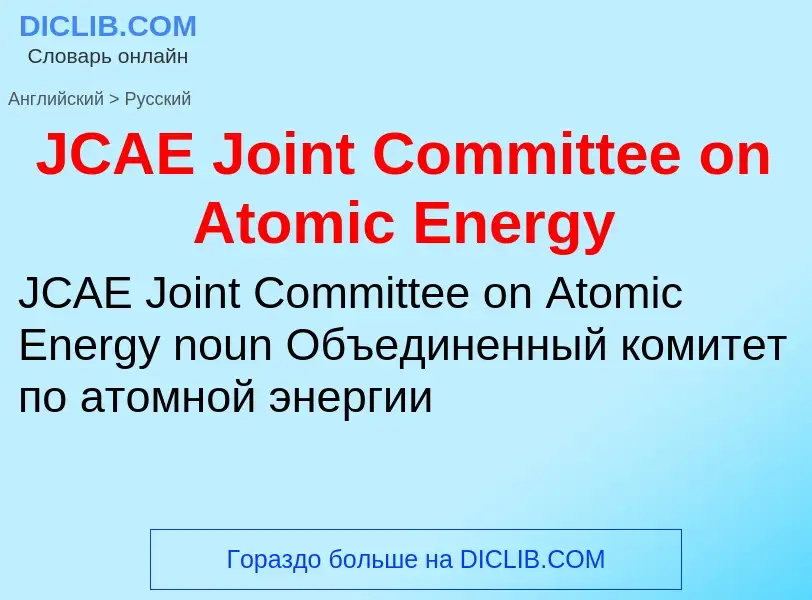Translation and analysis of words by ChatGPT artificial intelligence
On this page you can get a detailed analysis of a word or phrase, produced by the best artificial intelligence technology to date:
- how the word is used
- frequency of use
- it is used more often in oral or written speech
- word translation options
- usage examples (several phrases with translation)
- etymology
JCAE Joint Committee on Atomic Energy - translation to English
[ə,tɔmɪk,enədʒɪɔ:'θɔrɪtɪ]
общая лексика
Управление по атомной энергетике (государственная организация; имеет несколько научно-исследовательских центров и атомных электростанций. Создана в 1954)
полное выражение
United Kingdom Atomic Energy Authority
[ju:,naɪtɪd,kɪŋdəmə,tɔmɪk'enədʒɪɔ:,θɔrɪtɪ]
общая лексика
Управление атомной энергии Великобритании (ведёт научно-исследовательскую работу по развитию атомной энергии; основные центры в Харуэлле [Harwell], на Дунрейской атомной электростанции [Dounreay], Уиндскейле [Windscale]. Создано в 1954)
Definition
Wikipedia
The Atomic Energy Act of 1946 (McMahon Act) determined how the United States would control and manage the nuclear technology it had jointly developed with its World War II allies, the United Kingdom and Canada. Most significantly, the Act ruled that nuclear weapon development and nuclear power management would be under civilian, rather than military control, and established the United States Atomic Energy Commission for this purpose.
It was sponsored by Senator Brien McMahon, a Democrat from Connecticut, who chaired the United States Senate Special Committee on Atomic Energy, and whose hearings in late 1945 and early 1946 led to the fine tuning and passing of the Act. The Senate passed the Act unanimously through voice vote, and it passed the House of Representatives 265–79. Signed into law by President Harry S. Truman on August 1, 1946, it went into effect on January 1, 1947, and the Atomic Energy Commission assumed responsibility for nuclear energy from the wartime Manhattan Project.
The Act was subsequently amended to promote private development of nuclear energy under the Eisenhower administration's Atoms for Peace program in 1954. In restricting the access to nuclear information to other countries, it created a rift between the United States and its allies, particularly Britain and Canada, which had participated in the Manhattan Project. This resulted in cumbersome command and control arrangements, and in Britain developing its own nuclear weapons. The Act was amended in 1958 to allow the United States to share information with its close allies.

![President [[Harry S. Truman]] signs the Atomic Energy Act into law on August 1, 1946. Behind the President, left to right, are Senators [[Tom Connally]], [[Eugene D. Millikin]], [[Edwin C. Johnson]], [[Thomas C. Hart]], [[Brien McMahon]], [[Warren R. Austin]] and [[Richard B. Russell Jr]]. President [[Harry S. Truman]] signs the Atomic Energy Act into law on August 1, 1946. Behind the President, left to right, are Senators [[Tom Connally]], [[Eugene D. Millikin]], [[Edwin C. Johnson]], [[Thomas C. Hart]], [[Brien McMahon]], [[Warren R. Austin]] and [[Richard B. Russell Jr]].](https://commons.wikimedia.org/wiki/Special:FilePath/Atomic Energy Act of 1946 signing.jpg?width=200)

